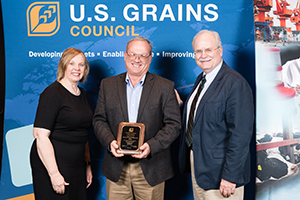Chip Councell waited 10 years for his spot on the U.S. Grains Council (USGC) Board of Delegates after a mission overseas sparked his interest. Now, the Council has recognized him for 10 years of service, including as the organization’s chairman, during the 15th International Marketing Conference and 58th Annual Membership Meeting in Houston, Texas.
Chip Councell waited 10 years for his spot on the U.S. Grains Council (USGC) Board of Delegates after a mission overseas sparked his interest. Now, the Council has recognized him for 10 years of service, including as the organization’s chairman, during the 15th International Marketing Conference and 58th Annual Membership Meeting in Houston, Texas.
Back in the late 1990s, Councell served as president of the Maryland Grain Producers Utilization Board, which led to him participating in a Pioneer international mission. Councell said he learned many lessons on the trip, including more about the Council’s work and that he wanted to be a part of the organization.
“I got an insight into what the Council did and what they had accomplished overseas,” Councell said. “I really saw the value to U.S. grain farmers, and it was something I found interesting and wanted to become involved in.”
After that experience, Councell waited a decade for the Maryland board representative to step down. When he did, Councell immediately took the chance to join as on official USGC delegate in 2008. He moved up through the ranks, serving on the Trade Policy Advisory Team (A-Team), then as the A-Team leader, then as the corn sector chair and finally running for a spot on the USGC officer team. He served as USGC chairman in 2016.
Councell counts his close proximity in Talbot County, Maryland, to Washington, D.C. as an asset to the Council.
“I can walk out my back door and walk into the front door of the Council in 65 minutes,” he said. “It is easy for me to run into the office or into D.C., and there are trade teams constantly circulating through D.C.”
Many of those USGC trade teams have swung by Councell’s farm on the Eastern Shore to catch a glimpse of the rural area’s viable grain economy.
“It is a good look at agriculture and the U.S. production system and the value chain,” Councell said. “We like to show them around the area and see a little of our operation. We also like to customize the visit to what the particular team is interested in.”
Many times, those trade teams wanted to learn more about biotechnology, and Councell was happy to share the impact it has made in his own farm and community.
“We like to show what we feel have been the advantages to our operation since the start of using biotech crops more than 20 years ago and what has that done for our operation as far as far as soil health and water quality,” he said. “We talk about the benefits that not only we as producers have seen, but again, because we farm in an environmentally sensitive area, what we feel have been the benefits to the environment.”
While the world has traveled to Councell’s piece of Talbot County, he has also traversed the globe during his years with the Council, visiting many of countries and regions where the organization operates.
“Each market has been a little different, but I have found them all to be extremely interesting in their own way,” he said. “If we look at value, not only to those end markets, but also to the U.S. farmer, they are a little bit different, but they are all important.”
Councell said that during his time with the organization, he has witnessed a rise in farmer voices in support of trade, seen the shift of the Council’s work to promoting corn co-products like ethanol and learned more than he thought possible from the Council’s staff, overseas customers and his fellow Council delegates.
“I’m really proud of what the Council has accomplished over the past several years,” he said. “I’ve met people from all over the world that have become true friends, what I consider to be some of the best farmers and agribusiness people that there are.”
“I’ve been fortunate enough to meet people from other countries and a lot of them have become real friends too. I have taken away more than I have given.”
Councell pointed out that not all the work is easy, but he said navigating the tricky parts of trade policy and market development work are when the Council’s value is truly realized.
“The Council shines when we work through those issues,” he said. “We put the right players in place, we provide information, and our real strong point is we have the talent and the ability to work through those problems.”
“At the end of the day, we do the best we can and work to ensure the outcome is favorable not only to U.S. corn, barley and sorghum producers and agribusiness members, but also that it works out in a mutual favorable interest to our customers.”
Councell reiterated his hopes that any member of the Council becomes as involved as they are able because that work has a real impact.
“I truly have been blessed, and I feel very fortunate to be able to see how at the end of the day we collectively make a difference,” Councell said. “I really believe in the mission of the Council: developing markets, enabling trade and improving lives. I do not think there are six words that have the ability to change the world as much as those.”


